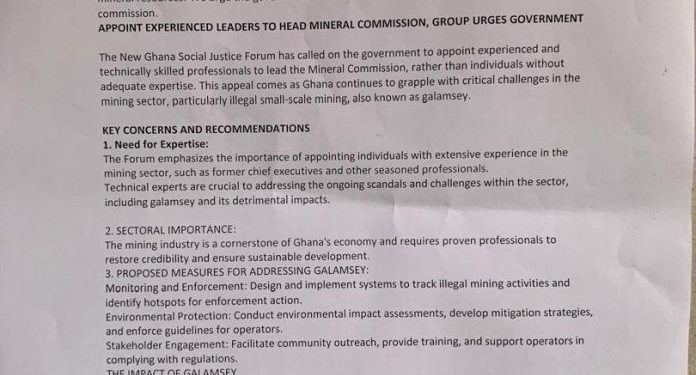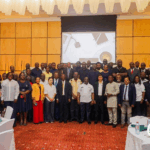The New Ghana Social Justice Forum has issued a stark warning to the government, declaring that the retention of Minerals Commission CEO Martin Kwaku Ayisi undermines public trust and contradicts the mandate for reform that voters endorsed in recent elections.
During a press briefing in Accra, the group’s president, Yahaya Alhassan, accused Ayisi of presiding over systemic corruption and administrative failures, including the alleged approval of 300 mining licenses for political allies without proper oversight.
“Ghanaians voted for change, not for the preservation of a broken system,” Alhassan stated, demanding Ayisi’s immediate removal. He criticized the Commission’s role in exacerbating illegal mining (galamsey), which has ravaged water bodies, farmlands, and forests, leaving communities grappling with toxic water supplies and ecological ruin. “The President must act decisively. Every day of inaction deepens this crisis,” he added.
The Forum’s call for Ayisi’s dismissal is tied to claims that his leadership enabled politically motivated licensing deals, bypassing regulatory checks. Alhassan urged the Office of the President to investigate and revoke permits granted under questionable circumstances, emphasizing that transparency in mineral resource management is non-negotiable.
Highlighting broader structural issues, the group pressed for a leadership overhaul at the Commission, advocating for seasoned mining professionals over politically connected appointees. “Technical expertise, not patronage, should guide this sector,” Alhassan argued, naming former industry executives as ideal candidates to restore credibility.
Illegal mining remains a festering challenge, with informal operations often linked to corruption, smuggling, and environmental negligence. The Forum proposed a three-pronged strategy: deploying surveillance systems to track illegal activities, enforcing stricter environmental safeguards, and engaging communities to promote compliance with mining laws.
Ghana’s mining sector, a critical engine of economic growth, contributes over 10% of GDP and 40% of export revenues. Yet, the proliferation of galamsey has overshadowed these benefits, with mercury pollution and deforestation threatening food security and public health. Analysts note that while successive governments have pledged crackdowns, enforcement remains inconsistent, often stymied by vested interests.
The Forum’s demands resonate with growing public frustration over accountability gaps. Civil society groups have long accused officials of turning a blind eye to illegal mining networks, some allegedly protected by influential figures. For Ghanaians in mining regions, the stakes are existential. “Our rivers are poisoned, our lands barren. How much longer must we wait?” asked a resident of the Ashanti Region, where illegal mining has displaced farmland.
As pressure mounts, all eyes are on President-elect Mahamudu Bawumia, who takes office in January 2025. The New Ghana Social Justice Forum insists that prioritizing competent, ethical leadership at the Minerals Commission will signal a commitment to sustainable development. “This is not just about replacing one official,” Alhassan concluded. “It’s about reclaiming Ghana’s resources for its people.”
The government has yet to respond publicly to the allegations. Meanwhile, activists warn that without urgent reforms, Ghana risks further environmental degradation and a erosion of faith in its institutions.
- President Commissions 36.5 Million Dollars Hospital In The Tain District
- You Will Not Go Free For Killing An Hard Working MP – Akufo-Addo To MP’s Killer
- I Will Lead You To Victory – Ato Forson Assures NDC Supporters
Visit Our Social Media for More





